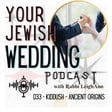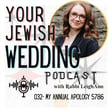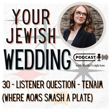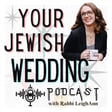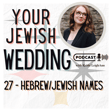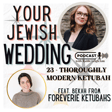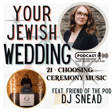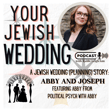
19 - The Chuppah: a Brief and Imperfect History
The Chuppah - Whether or not you've been pronouncing it correctly, you probably know it is one of THE visual symbols of a Jewish wedding. But where did it come from?
Yes! This is one of those super nerdy episodes where we talk about the Bible and the Talmud, with. - what else? - lots of tangents. :)
Don't forget - you can reach me (Rabbi LeighAnn) any time at www.yourohiorabbi.com or everyonesfavoriterabbi.com or rabbileighann.com !
Fill out the contact form there if you'd like to work with me on your wedding. There are SO many options, from Ketubah consulting to ceremony planning. If there's something you have in mind, don't hesitate to ask - I'm here to help!
IG: @yourohiorabbi
Podcast IG: @yourjewishweddingpodcast
Send questions for me to answer on this podcast to:
yourjewishweddingpodcast@gmail.com
Hope to see you next time! Remember - there is ALWAYS more learning to do!
<3 Rabbi LeighAnn
Show notes:
Bava Metzia: https://www.sefaria.org/Bava_Metzia.75b.15?lang=bi&with=all&lang2=en
Jewish Law on Placing the Chuppah outdoors:
https://outorah.org/p/27297/
Reference for synagogue skylights for a chuppah:
https://www.myjewishlearning.com/article/the-huppah-or-wedding-canopy/
Honi the Circle Maker:
https://www.emanuelnyc.org/2021/01/25/the-story-of-honi-and-the-carob-tree/
The art in my living room:
https://www.etsy.com/listing/1282770863/tree-of-life-no-2-paper-giclee-print
The photo of the indoor Jewish wedding I mentioned:
My Pinterest Page for Chuppahs:
